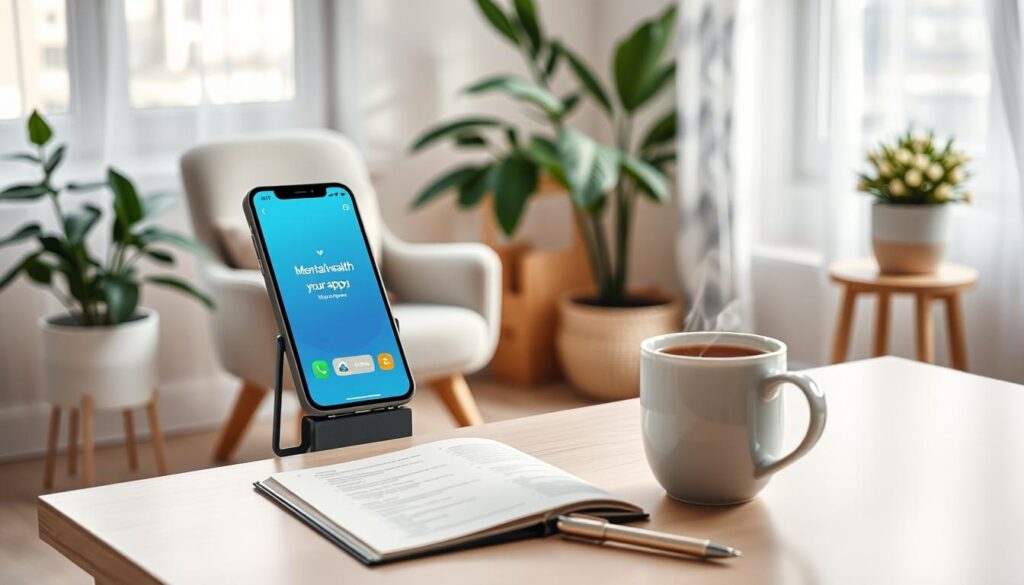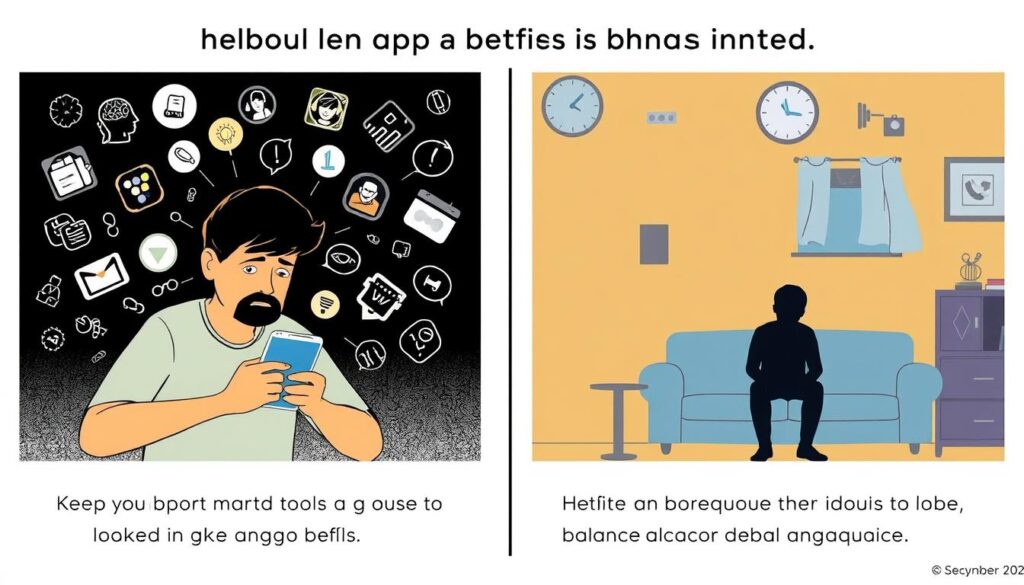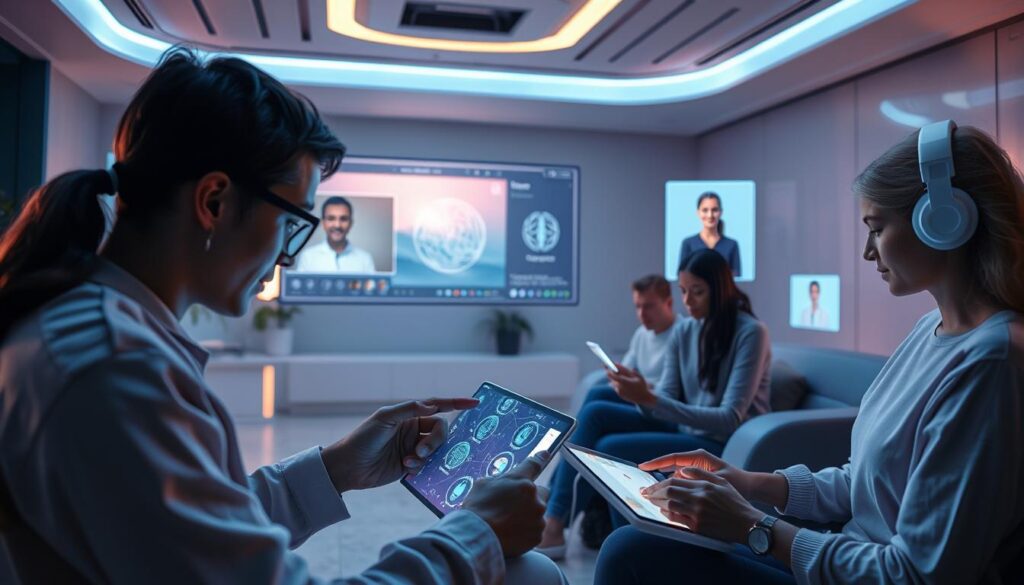The need for mental health support has grown, thanks to smartphones and wearables. The World Health Organization found that 29% of mobile health apps help with mental health1. These apps make it easier to get help by offering therapy online.
Studies show mental health apps can really help with depression and anxiety. A study of 18 trials found these apps can lower depression symptoms a lot1. Another study with over 2,000 people showed big drops in depression and anxiety scores after six weeks2.
Michigan Medicine’s research found apps with therapy and mindfulness can help a lot. Even before seeing a doctor, apps like Headspace and Silvercloud can improve mental health2.
Key Takeaways
- 29% of mHealth apps focus on mental health diagnosis, treatment, or support1.
- Meta-analyses show significant reductions in depressive symptoms using mental health apps1.
- Depression and anxiety scores dropped among users of mental health apps over a six-week period2.
- Headspace and Silvercloud are among the most effective apps according to recent studies2.
- Digital interventions can improve mental health even before starting professional therapy2.
The Rising Demand for Mental Health Care
The mental health crisis in the U.S. is clear, with 90% of people seeing it as a major issue3. Almost 40% of Americans reported feeling anxious or depressed at the start of the pandemic4. This shows we really need more mental health support services. But, many struggle to get help because of long wait times and other barriers.
Long Wait Times for Appointments
Now, 60% of psychologists can’t take on new patients, making it hard to get help quickly3. Over a third of people couldn’t get the mental health services they needed3. Cost, shame, and stigma are big reasons why many can’t seek help3.
The Role of Technology in Bridging the Gap
Technology, like telehealth and online counseling, is helping a lot. The government has made it easier to use digital mental health services4. This has led to more people using mental health apps for help.
There’s been a big push for digital mental health services, with $588 million invested in 20204. Now, we have more online counseling options, like video therapy and support groups3. Spending on mental health apps grew from $203 million to $269 million between 2019 and 20205.
Benefits of Using Mental Health Apps
Mental health apps have changed how we get help for our minds. They make mental health care easy and affordable. You can track your mood, get feedback, and find therapy that fits your life.
Accessibility and Affordability
One big plus of mental health apps is how easy they are to use. There are over 20,000 apps to pick from. They help with depression, anxiety, and stress, even where therapy is hard to find6.
These apps are also cheap. Many offer free versions or low-cost upgrades. This makes mental health help available to more people7.
| App | Key Features | Cost |
|---|---|---|
| Daylio Journal | Mood tracking, goal setting | Free; $4.99 per month for Premium |
| Talkspace | Live video therapy, messaging | $65+ per week |
| Headspace | Guided meditations, stress relief exercises | $12.99 per month or $69.99 per year |
| notOK | Peer support, GPS location services | Free |
| iBreathe | Customizable breathing exercises | Free with in-app purchases |
| MindShift CBT | Daily mood tracking, goal setting | Free |
| I Am Sober | Sober day tracker, milestone tracker | Free; $9.99 per month for Plus |
Convenience and Flexibility
Mental health apps are great because they’re so flexible. You can do therapy whenever and wherever you want. This is especially helpful during times like the COVID-19 pandemic7.
These apps also let you keep your mental health private. You can get help without anyone knowing. This makes it easier to keep up with your mental health.
Top Mental Health Apps for Therapy Access
Digital health solutions have grown, bringing mental health apps to our homes. These apps use cognitive behavioral therapy, mindfulness, and personalized support. They offer a full approach to mental health.
Silvercloud: Cognitive Behavioral Therapy
Silvercloud is known for its cognitive behavioral therapy programs. It helps with many mental health issues. There are 10,000 to 20,000 mental health apps out there, showing the demand for digital help8.
Silvercloud is special because it’s structured and effective. It helps with anxiety and depression using CBT.
Headspace: Mindfulness Practices
Headspace is popular for its mindfulness and meditation. It offers a free trial and then costs $12.99 a month or $69.99 a year9. Headspace and Calm are leaders in stress management and focus improvement.
The app is easy to use and fun. It makes mindfulness available to many people.
MyDataHelps: Personalized Feedback
MyDataHelps gives personalized mental health support. It uses data to suggest activities to improve mood. Personalized feedback boosts user engagement by meeting individual needs.
In the vast world of mental health apps, MyDataHelps stands out. It offers a unique way to manage mental health.
Comparing these apps shows their different strengths. Silvercloud focuses on CBT, Headspace on mindfulness, and MyDataHelps on personalized support. Each app addresses a different part of mental wellness, making them key in today’s digital health world.
Evidence-Based Effectiveness of Mental Health Apps
Mental health apps are getting more attention, and studies show they work well. A study of 176 trials found these apps help with depression and anxiety. They showed small but real effects, with symptoms improving more in app users than others.
Apps that use cognitive behavioral therapy (CBT) or chatbots help more with depression. For anxiety, apps with CBT and mood tracking work best. These apps also help with social anxiety and obsessive-compulsive symptoms, but less with post-traumatic stress.
Smartphones are becoming key for health issues, with 62% of users checking their health on them (Pew Research Center, 2015b)10. People from ethnic minorities and lower incomes use smartphones a lot. Yet, only 10% of Black or Hispanic people and 23% of low-income folks get mental health help (SAMHSA, 2015)10.
Searching for “mental health app” shows many options are available. Apple users have 100 apps, while Android users have 248. This variety means people can find effective mental wellness tools online.
How Mental Health Apps Support Mental Wellness
Mental health apps are a great tool for improving mental wellness. They have many features to help users understand their emotions better. These apps also help track progress and include mindfulness and meditation in daily life.
Tracking Mood and Activity
Many mental health apps focus on tracking mood and activity. Users can log their daily feelings and actions. This helps spot patterns and trends important for mental health tracking.
Apps like Sanvello offer mood tracking and access to counselors and peer support. This is especially helpful for teens and young adults11. About 25% of these apps focus on monitoring symptoms or mood. This encourages users to regularly check in with their emotions12.
By tracking moods and activities, users can better understand their emotional state. This helps them make informed choices about their mental health.
Mindfulness and Meditation Practices
Mental health apps also include mindfulness and meditation to reduce stress and improve emotional balance. For example, Headspace has been shown to reduce stress significantly when used daily for just 10 minutes. The benefits last up to two months after stopping use13.
Apps like Calm offer guided meditation, sleep techniques, and calming sounds. They are popular for their comprehensive mental wellness tools11. These features make it simple for people to add meditation to their daily routines. This helps them develop a deeper sense of self-awareness and emotional control.
In summary, mental health apps with mood tracking and mindfulness practices offer significant support for mental wellness. By using technology, users can actively monitor their mental health and develop emotional self-awareness. This leads to better mental health management.
Challenges and Limitations of Mental Health Apps
Mental health apps have grown a lot, with over 10,000 available today14. But, they face many challenges. One big issue is privacy, as many apps collect a lot of personal data15. They might even use this data for predictive analytics and share it with others like employers15.
There’s also a problem with not enough regulation in the app industry15. This means some apps might not be safe or effective. Plus, users might not use these apps often, which makes them less helpful14.
Another big problem is that these apps can’t replace human interaction15. Mental health treatment often needs a personal touch that apps can’t provide. The report shows that many Americans can’t get the mental health care they need15.
Mental health apps could be a good tool if used right. But, we need to fix the privacy and trust issues first. This will help make them a useful addition to mental health care.
Integrating Mental Health Apps with Professional Therapy
Mental health apps are changing how we get help. They work with traditional therapy to make treatment better. These apps fill the gaps between sessions.
Enhancing Traditional Therapy
Mental health apps can help traditional therapy a lot. They offer quick support when you need it. With AI and machine learning, these apps are getting smarter and more helpful16.
Studies show apps with human help work better than ones without17. This mix of digital and human support can lead to better therapy results. It keeps people interested in their mental health care17.
Providing Support While Waiting
Apps are great for people waiting to see a therapist. There are many apps, like mood trackers and CBT apps, to help manage symptoms17. They’re especially useful when you’re feeling stressed or anxious17.
Apps are easy to use and don’t cost much. They’re perfect for those who can’t see a therapist right away16.
Here’s a table showing how mental health apps and therapy work together:
| Feature | Mental Health Apps | Professional Therapy | Hybrid Therapy Models |
|---|---|---|---|
| Accessibility | 24/7 Availability | Scheduled Appointments | Combined Availability |
| Cost | Low to Free | Varies | Varies |
| Support | Self-Help Tools | Professional Guidance | Blended Support |
| Effectiveness | Dependent on Consistent Use | Proven Efficacy | Enhanced Efficacy |
Mental health apps and therapy together are a big step forward. They offer a full support system through hybrid therapy models.
Future Directions in Mental Health Technology
The world of mental health tech is changing fast. New ideas in mental health, custom therapy, and better telehealth are leading the way. There are thousands of mental health apps in stores, and more are coming every year18. This shows how much people want easy and good mental health help.
One big area is making therapy fit each person better. Telehealth helps make this possible. Apps let users track their own progress and get feedback, making therapy more personal and helpful18. There are also apps that teach new skills in a fun way, making therapy more engaging18.
Telehealth has also made big strides. The COVID-19 pandemic made virtual visits more common, showing how important digital health is19. It also showed we need to make sure everyone can get online mental health help19.
To make these tech tools better, we need clear rules for using them in clinics19. A study in May 2023 brought together experts to talk about digital mental health19. They talked about how to make mental health apps better, like combining checks with therapy and doing more studies19.
Looking to the future, research is key to improving digital health tools. The BRIGHTEN study showed tech can help treat and study mental health18. Research apps are getting smarter, helping us learn more about mental health and how well treatments work18. With so many people needing help, digital solutions could really help fill the gap20.
In short, the future of mental health tech is bright. It will bring us more custom therapy and better telehealth. These changes could make mental health care better, reaching more people around the world. As we keep improving these tools, their impact on mental health care will grow even more.
Conclusion
Technology is key in helping people manage their mental health. During the COVID-19 pandemic, 41% of U.S. adults felt very stressed. Also, 122 million Americans don’t have easy access to mental health care21.
Mental health apps make managing stress easier and more flexible. They help overcome traditional healthcare barriers. Studies show these apps can have a positive impact on mental health22.
As we move forward, combining mental health apps with therapy could be a game-changer. These apps can offer support while waiting for therapy. They also improve therapy results. By focusing on research and quality, we can help more people on their mental health journey.
FAQ
What is the current state of mental health care access?
How do mental health apps provide support during wait times for professional appointments?
What benefits do mental health apps offer for managing mental wellness?
Which are some of the top mental health apps available?
How effective are mental health apps in treating conditions like anxiety and depression?
What features do mental health apps offer to support mental wellness?
What challenges do mental health apps face?
How can mental health apps be integrated with traditional therapy?
What is the future direction of mental health technology?
Source Links
- https://www.ncbi.nlm.nih.gov/pmc/articles/PMC5897664/
- https://www.michiganmedicine.org/health-lab/mental-health-apps-may-help-those-waiting-care-study-finds
- https://www.apa.org/monitor/2024/01/trends-pathways-access-mental-health-care
- https://www.kff.org/mental-health/issue-brief/rise-in-use-of-mental-health-apps-raises-new-policy-issues/
- https://www2.deloitte.com/us/en/insights/industry/technology/technology-media-and-telecom-predictions/2022/mental-health-app-market.html
- https://www.purrweb.com/blog/mental-health-app-development-features-benefits-costs/
- https://www.healthtechzone.com/topics/healthcare/articles/2021/11/24/450730-five-benefits-mobile-health-apps-protecting-mental-health.htm
- https://hartfordhealthcare.org/about-us/news-press/news-detail?articleid=59534&publicId=395
- https://www.verywellmind.com/best-mental-health-apps-4692902
- https://s3.wp.wsu.edu/uploads/sites/1012/2018/10/Evidence-based-apps-A-review-of-mental-health-mobile-applications-in-a-psychotherapy-context.pdf
- https://onlinedegrees.bradley.edu/blog/mental-wellness-apps
- https://www.psychiatry.org/news-room/apa-blogs/mental-health-apps-evidence-not-so-plentiful
- https://hr.ucsf.edu/wellbeing/coping-and-resiliency-program/cope-program-wellness-resources/useful-wellness-and-mental-health-apps
- https://www.ncbi.nlm.nih.gov/pmc/articles/PMC9505389/
- https://theweek.com/the-big-debate/1025872/mental-health-apps-pros-and-cons
- https://www.holonsolutions.com/mental-health-apps-a-new-wave-of-support-for-mental-wellness/
- https://www.psychiatrictimes.com/view/integrating-mental-health-apps-into-care-with-your-patients-what-you-need-to-know
- https://www.nimh.nih.gov/health/topics/technology-and-the-future-of-mental-health-treatment
- https://www.ncbi.nlm.nih.gov/pmc/articles/PMC10231442/
- https://www.psychiatry.org/psychiatrists/practice/digital-mental-health
- https://www.techtarget.com/virtualhealthcare/news/366596523/Digital-apps-effective-stopgap-for-mental-healthcare-access-challenges
- https://mhealth.jmir.org/2020/5/e17458/






